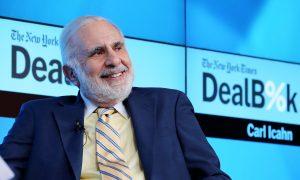‘Shareholder activist’ investor gets seat on public utility board despite reservations about mixing profit and public services.
Federal regulators have approved activist investor Carl Icahn’s bid to seat a corporate officer on one of the nation’s biggest public utility boards despite concerns about balancing profit motives with public interest.
The Federal Energy Regulatory Commission (FERC), required under federal law to scrutinize and endorse appointments to investor-owned public utility boards, granted American Electric Power Company’s (AEP) request to add an Icahn Enterprises executive to its board even though the firm owns less than 2 percent of the company.
The order adheres to a March FERC determination that eliminated the historic threshold that an investment interest must have at least 10 percent ownership in a public utility to warrant an “affiliation” or voting seat on its board.
Columbus, Ohio-based AEP supplies electricity to utilities across 11 states with more than 200,000 miles of transmission lines serving 5.6 million ratepayers. Along with Duke Energy Corp., NextEra Energy, Inc., and The Southern Company, it is among the largest investor-owned public utilities in the United States.
Icahn Enterprises is a master limited partnership (MLP) with $16 billion in assets with seats on dozens of boards on companies it effectively owns, such as its 66-percent share in CVR Energy, and on those where it is a minority or even a marginal shareholder, such as a 15-percent share in Southwest gas, and a 10-percent share of JetBlue Airways, and about 1.5 percent of AEP.
Mr. Icahn, an icon of the 1980s “corporate raiders,” is now regarded as a shareholder activist in his penchant for investing in undervalued markets where operating efficiencies can drive profits for investors.
Chair Willie Phillips and commissioners David Rosner and Doug Christie agreed that AEP’s board appointment of Icahn Senior Managing Director Hunter Gary does not violate “public interest” under the Federal Powers Act (FPA).
Commissioners said AEP’s “change in control” wouldn’t affect the three factors it gauges in defining public interest—effect on rates, effect on regulation, and “not result in cross-subsidization of a non-utility associate company or … encumbrance of utility assets for the benefit of an associate company.”
AEP announced in February an agreement with Icahn Capital LP that put Mr. Gary and Hank Linginfelter, a retired vice president of Southern Gas Co., on its board.
Icahn Capita portfolio manager Andrew J. Teno is also a “non-voting observer” on the board.
In March, the AEP board ousted president, chair, and CEO Julie Sloat and replaced her with Benjamin G.S. Fowke III, the former chairman and CEO of Xcel Energy.

‘Hostile Takeover’ Protest Dismissed
Public Citizen, the nonprofit consumer rights advocacy group founded by Ralph Nader, protested the order, claiming by the time FERC acted, Ichan Enterprises’ “hostile takeover” of a public utility was a done deal with Ms. Sloat’s “involuntary termination.”
“But Mr. Icahn is not a typical investor. He is an activist investor” who specializes in “protracted, hostile shareholder fights to gain control of target corporations for the sole purpose of moving the company’s stock price to a pre-determined target that bestows considerable profit for Mr. Icahn,” he writes.
Ichan Enterprises is “uninterested in providing long-term capital investment to assist a public utility in ensuring the reliability of the bulk power market or delivering just and reasonable rates,” Mr. Slocum said. “Rather, Mr. Icahn exploits regulatory loopholes to transform companies into mere speculative commodities to serve his short-term investment whims.”
The commission said Public Citizen failed to address the factors it gauges in assessing “public interest” or provide any evidence supporting its allegations, but it did chide AEP for failing “to file a timely request for approval of the appointment of the Icahn Group designee to the AEP board.”
“An investor seeks to place a director on the board of directors of a company for only one reason—to exert its influence on the company’s decision-making and actions,” he wrote.
Although utilities are private, for-profit companies, they are public service infrastructure and heavily regulated by state public utility commissions (PUCs) and FERC. Thus, as Mr. Christie noted, they are “not typical for-profit, shareholder-owned companies.”
Electrical utilities “are usually holders of a state-granted monopoly franchise that comes with various public service obligations, such as providing reliable power service at rates that are just and reasonable,” he wrote. “So whether a public utility is owned by investors directly or through a holding company structure, it is absolutely essential for regulators to make sure that the interests of investors do not conflict with the public service obligations that a utility has.”
Defining that “potential for a conflict—and there always is”—is FERC’s responsibility under FPA Section 203, Mr. Christie said, which “in my view … must involve balancing consumer protection and potential impacts to reliability with the interests of investors in addition to evaluating traditional market power concerns.
“These issues are ripe for action,” he concluded, “and I look forward to continued consideration of them with my colleagues.”
Original News Source Link – Epoch Times
Running For Office? Conservative Campaign Consulting – Election Day Strategies!


